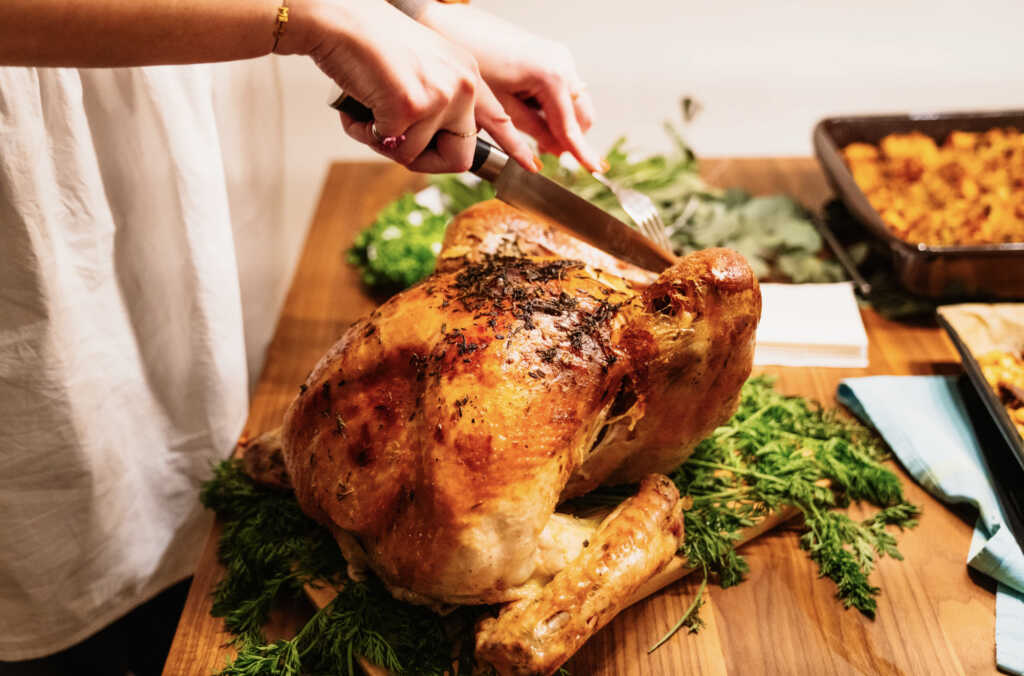Americans celebrating Thanksgiving this year should expect serious sticker shock at the grocery store, thanks to inflation and a severe disruption in supply chains.
According to a report published this week by The New York Times, the November feast “is shaping up to be the most expensive meal in the history of the holiday.”
LISTEN TO TODAY’S PODCAST AND SUBSCRIBE:
The U.S. Department of Agriculture, for example, released data recently showing the average wholesale price of Grade A frozen 8- to 16-pound turkey has spiked by 21.91% since last year. That means what cost $1.15 per pound a year ago will now ring at at $1.41. And just for context, the same would have cost 96 cents in 2019 and 84 cents in 2018.
If math isn’t your thing, that’s a 68% wholesale price increase in just two years.
Former President Donald Trump’s eldest son tweeted The Times article, asking, “Wait, what happened? I was told, very sanctimoniously, that we should be grateful to have saved $0.16 on my 4th of July BBQ that the government was so gracious to allow me to have.”
Donald Trump, Jr., was poking fun at a tweet from the Biden administration noting people would be saving 16 cents on their Independence Day cookouts over the previous year.
The price spikes aren’t just for the turkeys, either.
Year-on-year average retail price rises as of mid-October include pumpkins up 20%, baby carrots up 19%, blackberries up 11%, honeycrisp apples up 10%, and russet potatoes up 13%, just to name a few.
Then there’s the uptick in the cost of raw ingredients, according to The Times:
Packaged dinner rolls will be pricier because the cost of almost all of the ingredients that commercial bakers use has gone up. Canned cranberry sauce will cost more because domestic steel plants have yet to catch up after pandemic shutdowns, and China is limiting steel production to reduce carbon emissions. As a result, steel prices have remained more than 200 percent higher than they were before the pandemic.
And it doesn’t look like the trend will slow, either.
John Catsimatidis, the billionaire owner of Gristedes and D’Agostino Foods, told Fox Business he expects food prices to rise “tremendously” in the coming months.
“I see over 10% [price increase] in the next 60 days,” he forecasted on Oct. 18.
Hoping to get ahead of the curve, a lot of major brands — like Coca-Cola, PepsiCo, and Nabisco — are “dropping all promotions” and “dropping low-moving items,” Catsimatidis said, adding, “Why give away something when you don’t have to give it away and you make more margin? So I think that now these companies are going to have record profits in the third quarter.”
White House press secretary Jen Psaki was dinged by many on social media last week, when she seemingly downplayed the significance of supply chain disruptions.
On Sunday, though, U.S. Treasury Secretary Janet Yellen predicted during an interview with CNN’s Jake Tapper that inflation would remain in place late into 2022.
Tapper confronted Yellen on the matter, telling the Biden Cabinet member that “this rising inflation is hitting Americans’ wallets hard, impacting everything from gas prices to groceries.” He asked, “When do you expect the inflation to get back to the 2% range, which is considered normal? 2022? 2023? When?”
“Well, I expect that to happen next year,” Yellen replied. “Monthly rates of inflation have already fallen substantially from the very high rates that we saw in the spring and early summer. On a 12-month basis, the inflation rate will remain high into next year because of what’s already happened. But I expect improvement by the end of — by the middle of — next year, second half of next year.”
She admitted the country is “going through a period of inflation that’s higher” than most Americans have seen.
***As the number of voices facing big-tech censorship continues to grow, please sign up for Faithwire’s daily newsletter and download the CBN News app, developed by our parent company, to stay up-to-date with the latest news from a distinctly Christian perspective.***



